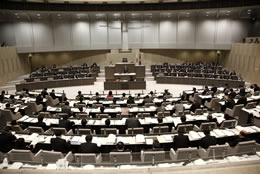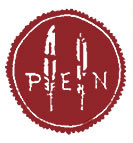News
Writers, Lawyers Oppose Revised Youth Ordinance Bill
posted on by Egan Loo
 The Japan PEN Club and the Tokyo Bar Association both announced on Thursday that they opposed the Tokyo Metropolitan Government's new attempt to amend the Youth Healthy Development Ordinance. In addition, the general affairs division of the Tokyo Metropolitan Assembly's Democratic Party of Japan (DPJ) is meeting with manga creators on Monday on the matter. The current ordinance already prevents the sale and renting of "harmful publications" — materials that are "sexually stimulating, encourages cruelty, and/or may compel suicide or criminal behavior."
The Japan PEN Club and the Tokyo Bar Association both announced on Thursday that they opposed the Tokyo Metropolitan Government's new attempt to amend the Youth Healthy Development Ordinance. In addition, the general affairs division of the Tokyo Metropolitan Assembly's Democratic Party of Japan (DPJ) is meeting with manga creators on Monday on the matter. The current ordinance already prevents the sale and renting of "harmful publications" — materials that are "sexually stimulating, encourages cruelty, and/or may compel suicide or criminal behavior."
The proposed Bill 156 would require the industry to also self-regulate the sale and renting of "manga, anime, and other images (except for real-life photography)" that "unjustifiably glorify or exaggerate" certain sexual or pseudo sexual acts. The revised bill will specifically target depictions of "sexual or pseudo sexual acts that would be illegal in real life, or sexual or pseudo sexual acts between close relatives whose marriage would be illegal" and therefore be "detrimental toward the healthy development of youth." Another section of the revised bill would allow the government to directly restrict the sale and renting of the above images if the depicted acts are also "considered to be excessively disrupting of social order" such as rape.
 Under the name of their president Takashi Atōda, the literary writers in the Japan PEN Club said that the proposed bill would "warp the freedoms of speech and expression" and allow the government to have the authority to enter into areas of people's privacy. The organization had also opposed the earlier version of the bill in March, and the Tokyo Metropolitan Assembly rejected that version in June.
Under the name of their president Takashi Atōda, the literary writers in the Japan PEN Club said that the proposed bill would "warp the freedoms of speech and expression" and allow the government to have the authority to enter into areas of people's privacy. The organization had also opposed the earlier version of the bill in March, and the Tokyo Metropolitan Assembly rejected that version in June.
![]() Under the name of their president Kazuo Wakatabi, the lawyers of the Tokyo Bar Association noted that the revised bill removes the controversially vague term "nonexistent youth," which was used to define which characters' images should be restricted. However, the association said that the revised bill now uses the vague term "exaggerated" to define the restricted materials, and the association added that manga, anime, and other media are "exaggerated" almost by nature. The association concluded that there is concern that the restrictions would violate the freedom of expression.
Under the name of their president Kazuo Wakatabi, the lawyers of the Tokyo Bar Association noted that the revised bill removes the controversially vague term "nonexistent youth," which was used to define which characters' images should be restricted. However, the association said that the revised bill now uses the vague term "exaggerated" to define the restricted materials, and the association added that manga, anime, and other media are "exaggerated" almost by nature. The association concluded that there is concern that the restrictions would violate the freedom of expression.
Yukie Nogami, a second-term DPJ legislator in the Tokyo Metropolitan Assembly, reported on her Twitter account that her party's general affairs division will meet with Tetsuya Chiba (Ashita no Joe) and other manga creators on Monday regarding the revised bill. The division plans to also hear from four publishing associations on that day. DPJ is currently the largest party of the assembly; it opposed the earlier bill.
Chiba has expressed his opposition to the revised bill and predicted how it would affect creativity in the manga industry in a November 26 blog entry. Chiba had joined other manga creators in opposing the earlier bill.
Translator Dan Kanemitsu noted on Wednesday that the revised bill, just like the earlier version, covers several other areas such as Internet filtering on phones used by minors under the age of 18. The revised bill also calls for the industry to deal with a publisher who release six or more "harmful publications" within a one-year period. If the publisher releases another "harmful publication" within the next six months, Tokyo's governor can identify the publisher in public with supporting documentation.
Thanks to Dan Kanemitsu for the news tip.
Source: ITmedia News
this article has been modified since it was originally posted; see change history